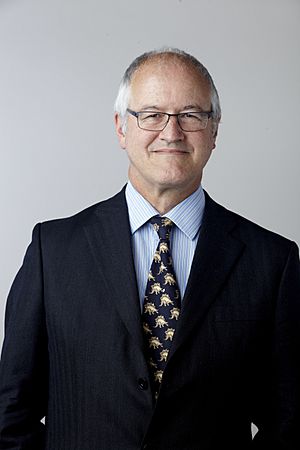Michael Benton facts for kids
Quick facts for kids
Michael Benton
|
|
|---|---|

Benton in 2014
|
|
| Born |
Michael James Benton
8 April 1956 |
| Nationality | British |
| Education | Robert Gordon's College |
| Alma mater |
|
| Known for | Bentonyx |
| Awards | Lyell Medal (2005) Lapworth Medal (2024) |
| Scientific career | |
| Fields | |
| Institutions | University of Bristol |
| Thesis | The Triassic reptile Hyperodapedon from Elgin, functional morphology and relationships (1981) |
Michael James Benton (born 8 April 1956) is a British scientist who studies ancient life. He is a professor of vertebrate palaeontology at the University of Bristol. His work mainly focuses on how Triassic reptiles evolved. He also studies extinction events, which are times when many types of animals and plants died out.
Contents
Becoming a Scientist
Michael Benton studied at Robert Gordon's College, the University of Aberdeen, and Newcastle University. He earned his PhD degree in 1981. A PhD is a very high university degree that shows someone is an expert in their field.
Studying Ancient Life
Professor Benton's research looks into palaeobiology, which is the study of ancient life forms, and palaeontology, which is the study of fossils. He also studies macroevolution, which is how big changes happen in life over long periods.
His main interests include:
- How different types of life have grown and changed over time.
- How good the fossil record is for understanding the past.
- Why some groups of animals and plants died out in mass extinctions.
- How life on Earth recovered after huge extinction events.
He has made important discoveries about how life's variety has changed through history. He is a leader in using information from both living animals and fossils to figure out how major groups of animals first appeared and then spread out. This way of thinking has changed how we understand big questions, like why some animals survived and others didn't.
One of his key areas of study is the Permian–Triassic extinction event. This was the biggest mass extinction ever, happening over 250 million years ago. He investigates how life managed to recover after such a terrible event.
Books and Media Work
Michael Benton has written many books about palaeontology. These include textbooks for university students, like Vertebrate Palaeontology, and also fun books for children about dinosaurs. His work has been published in many science magazines.
He has also helped with many TV shows about dinosaurs and ancient life. For example, he advised on the BBC show Walking with Dinosaurs. He was also a consultant for Paleoworld on Discovery Science. In 2002, he helped with the BBC program The Day the Earth Nearly Died, which explored the mysteries of the Permian extinction.
Honoring His Work
In December 2010, a type of ancient reptile called a rhynchosaur was named in his honor. It was called Bentonyx. This is a special way to recognize a scientist's contributions.
Professor Benton started a special Master of Science degree program in Palaeobiology at Bristol University in 1996. More than 300 students have completed this program. He has also guided over 50 students who were working on their PhD degrees.
He was also involved in starting the Bristol Dinosaur Project. He helped create and design the website for this project, which teaches people about dinosaurs found in the Bristol area.
Publications
Michael Benton has written or helped write many books. Here are some of them:
- Dinosaurs an A-Z Guide (1988)
- Prehistoric Animals (1989)
- Vertebrate Palaeontology (4th edition, 2014)
- On the trail of the dinosaur (1989)
- Basic Palaeontology (1997, with D. A. T. Harper)
- Walking with dinosaurs: the facts (2000)
- When life nearly died: the greatest mass extinction of all time (1st edition, 2003; 2nd edition, 2008)
- Introduction to Paleobiology and the Fossil Record (2009, with David A.T Harper)
- The Dinosaurs Rediscovered: How a Scientific Revolution is Rewriting History (2019)
- Dinosaurs: New Visions of a Lost World (2021)
- Extinctions: How Life Survives, Adapts and Evolves (2023)
- Dinosaur Behavior: An Illustrated Guide (2023)
Awards and Recognition
Michael Benton has received many important awards for his work.
- In 2014, he was chosen as a Fellow of the Royal Society (FRS). This is a very high honor for scientists in the UK.
- He is also a Fellow of the Royal Society of Edinburgh (FRSE).
- In 2021, he was given the title of Officer of the Order of the British Empire (OBE). This award recognized his services to palaeontology and his work in sharing science with the public.
- In 2024, he received the Lapworth Medal from the Palaeontological Association.
 | Sharif Bey |
 | Hale Woodruff |
 | Richmond Barthé |
 | Purvis Young |

